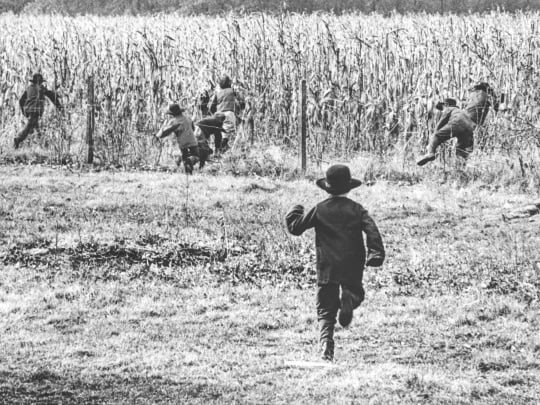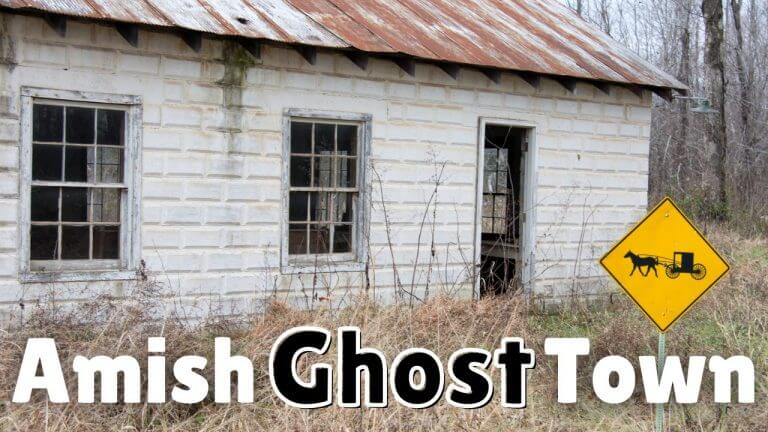William C. Lindholm 1932 – 2020
A very important person as regards Amish religious freedom passed away a month ago. I’m not sure how many Amish people know of William C. Lindholm today, but he was instrumental to the freedoms Amish now have in educating their children.
 Young Center Senior Scholar Steven Nolt shares the following on Lindholm and his relevance to the Amish:
Young Center Senior Scholar Steven Nolt shares the following on Lindholm and his relevance to the Amish:
The Rev. William “Bill” C. Lindholm, the Lutheran pastor who championed Amish religious liberty, most famously in the school cases that became Wisconsin v. Yoder (1972), died on May 9, age 88. His funeral, delayed due to current public health restrictions, took place on Saturday, June 6, in Livonia, Michigan.
An Iowa native, Bill Lindholm served Lutheran churches in Michigan from 1958 until his retirement in 2002. During the 1960s, he developed a Lutheran summer camp in Oscoda County, Michigan, not far from the Amish settlement at Mio. As he explained in a 1993 essay, he first got to know the Amish when he hired members of the community to help construct the camp. They soon became good friends. As he learned more about their faith and life, he also too an interest in the conflicts brewing around compulsory schooling and the Amish. At the time, the states of Pennsylvanian, Ohio, and Indiana had granted exemption from high school attendance, but Wisconsin had not, and a case there seemed headed for court.
Lindholm spearheaded the formation of the National Committee for Amish Religious Freedom (NCARF), comprised of lawyers, educators, academics, and civil rights advocates, and sponsored the case as it moved through the state courts and eventually to the U.S. Supreme Court, where it became Wisconsin v. Yoder. Lindholm strongly believed that religious liberty should include not only the freedom to believe, but also the freedom to practice one’s beliefs.

Buchanan County, Iowa, 1965. Amish children flee from police into a cornfield. The incident captured in this photo, by Des Moines Register photographer Thomas DeFeo, would help galvanize support for the Amish from Lindholm and others
In Wisconsin v. Yoder the Supreme Court unanimously sided with the Amish. The case set a precedent for other religious liberty cause, as well as legitimating alternative approaches to education, such as the Navajo community-led school movement.
In the decades after 1972, Lindholm continued to take an interest in religious liberty causes and, through the NCARF to challenge legal restrictions on the expression of Amish religious beliefs. In his later years, Bill gave considerable energy to providing care for his wife, Patricia Schneider Lindholm, until she died in 2018. They had three children and two grandchildren.
You can read the story of Lindholm meeting the Amish referenced above, and more from Lindholm on his work with the Amish, in Chapter 6 of The Amish and the State (“The National Committee for Amish Religious Freedom”).
Lindholm’s website, with more on the Wisconsin v. Yoder case, is amishreligiousfreedom.com.
Rest in peace.







Religious Freedom
Learning about William Lindholm was very interesting because he was a man of faith helping others of faith. Religious faith is very important for those who live out their lives in accordance to it. Many people claim faith but it often is not lived out. During this time of the pandemic states have declared the meeting for religious services nonessential. Therefore church gatherings were not allowed. It seemed that most churches agreed with the decision and stopped meeting. They did not believe gathering for worship was essential for living out their faith. They seemed to say health is more important than worshipping together. I am wondering if churches will ever be the same. If fear of catching a virus that could kill you or you could spread causes the ending of worshipping the Lord God then what does that say about your faith in him? If God will not be worshipped by the gathering of believers because of fear of dying then why do we worship? Do we worship the living God? If so then it seems to be the most essential activity any believer can and must do. Give unto Cesar what is Cesars and to God what is Gods. God is to be worshipped!
Worshipping Our God & Lord
Worshipping God, following him, does not mean meeting in a Bldg. called a Church! (to me, at least) Worshipping with other believers is certainly
helpful & VERY good thing, but where does it say in the Bible, that one must do so?
If the law of our land, says it is not safe, than I think God would agree! Would you stand in the middle of a freeway, & expect God to protect you there, Mr. Simon?
God is to be worshipped ~ I Agree, ~but God does want us to follow him, wherever we are, I believe! Would you agree with that, or do you only worship HIM in a church building?
Amen ~
Gather for worship
CJ I totally agree that we can and must worship Jesus in all places and at all times. He is the Creator God who holds us together by his word. The Father, Son and Holy Spirit are to praised and worship for their gracious gift of eternal life through the gospel message. I do believe also that the gathering of saints is an essential part of being believers of Christ. We are his body and need each other for love and good works. The new church in Acts demonstrates how they lived and worshipped the Lord.
“And they devoted themselves to the apostles’ teaching and the fellowship, to the breaking of bread and the prayers. And awe came upon every soul, and many wonders and signs were being done through the apostles. And all who believed were together and had all things in common. And they were selling their possessions and belongings and distributing the proceeds to all, as any had need. And day by day, attending the temple together and breaking bread in their homes, they received their food with glad and generous hearts, praising God and having favor with all the people. And the Lord added to their number day by day those who were being saved.”
Acts 2:42-47 ESV
We all should check our heart and decide if we believe how then should we live. I see the Amish demonstrating that very well.
what the Bible says
Matthew 6:5,6
Worship is praying and more
Boyce I agree that praying to God can be done in private because God hears our prayers even if we don’t speak them. The people who were the hypocrites that Jesus was admonishing were the Pharisees who stood in the temple and were praying out loud to the people to get their approval not hearts toward God. If you have ever prayed in a gathering of people it can be easy to pray with the people in mind and put God second on the list or not at all. We all can be hypocrites if our hearts are not close to Jesus. Private prayer with God is very important but gathering is important also.
Standing up for your neighbor
Rev. Lindholm saw his neighbors in need and took action!
Thats what God wants us as Christians to do! It’s so strange to me that anyone could claim to be a christian, and then turn a blind eye, and a deaf ear to them. But that unfortunately is exactly what most who claim to be christian do! And that’s also where I strongly believe Amish are lacking. We stuggle against powers and principalities in high places for the kingdom of God. At least Christians do! If you don’t love your neighbor, then you don’t love God. You know the rest of the song!
His neighbors needs were consistent
What were the Rev Lindholm’s neighbors needs? The Amish wanted to live there lives in response to their belief in the Bible. They did not want to be be treated equal or better than others but wanted to be free to live their beliefs. Their belief’a did not infringe on other people or hinder other people from pursuing their goals. They just wanted to live their convictions in a peaceful, non threatening way. When we see our neighbors desiring to live a way that respects others and follows common moral rules then we should do everything we can to help them.
Hebrews 10:24-25 NIV
24 And let us consider how we may spur one another on toward love and good deeds, 25 not giving up meeting together, as some are in the habit of doing, but encouraging one another—and all the more as you see the Day approaching.
Our first Sunday in worship will be Father’s Day, and we can’t wait to see our church family in person!
Recently I had a conversation with Amish friends about church and what it means. For the Amish meeting in person at church is a way to stay connected with your church family. No phone calls like we do, so it’s letters in the mail. They are making adjustments just like we are doing.
Tomorrow evening we have a meeting at church on just what our plan is for 6/21. Going to church was never complicated….well, it is now. As a friend used to say, I’m not complaining, I’m explaining!
Blessings, and safe in Christ we remain †